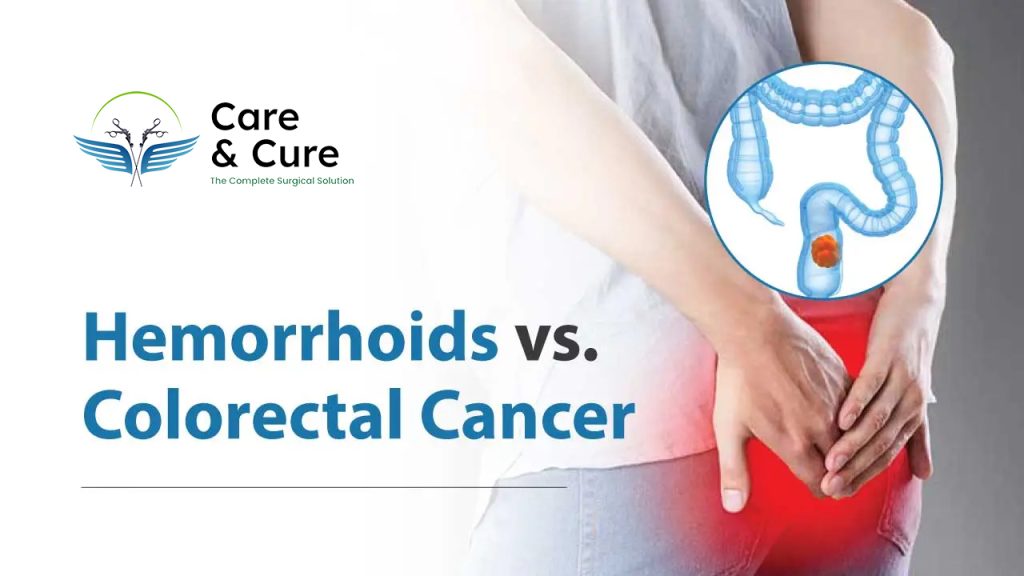
Hemorrhoids, commonly known as piles, affect millions of people worldwide. They are swollen veins in the rectal or anal area, often leading to discomfort, itching, or rectal bleeding. But one question that frequently troubles patients is: “Can piles cause cancer?” or “Do hemorrhoids cause cancer?” This blog explores the difference between piles and cancer, whether there is a piles and cancer link, and how to identify symptoms that may need further medical evaluation.
Understanding Piles (Hemorrhoids)
Hemorrhoids are classified into two types:
- Internal Hemorrhoids: Located inside the rectum
- External Hemorrhoids: Found under the skin around the anus
While piles can cause symptoms like:
- Pain or discomfort
- Swelling around the anus
- Rectal bleeding (bright red blood)
- Itching or irritation
These symptoms often overlap with other conditions, including colorectal cancer. That’s where the confusion begins.
Can Piles Cause Cancer?
According to multiple medical sources, hemorrhoids are not cancerous, and there’s no evidence that hemorrhoids can cause cancer.
However, that does not mean they should be ignored. The risk of developing colorectal cancer in patients with hemorrhoids is not due to the piles themselves, but because the symptoms of hemorrhoids and colorectal cancer share similar symptoms, such as:
- Rectal bleeding
- Changes in bowel habits
- Pain or discomfort during bowel movements
This similarity makes diagnosing the difference between hemorrhoids and cancer critically important.
Related Post
Top Post
Piles vs Cancer: How to Spot the Difference
Here’s a quick comparison of piles symptoms vs cancer symptoms:
| Symptom | Piles | Colorectal Cancer |
|---|---|---|
| Rectal Bleeding | Bright red blood, often on toilet paper | Darker blood, mixed with stool |
| Pain | During bowel movements or when sitting | Persistent pain, sometimes abdominal |
| Bowel Habits | Usually normal | May include diarrhea, constipation, or narrow stools |
| Weight Loss | Rare | Unexplained weight loss is common |
| Fatigue | Rare | Often due to anemia from blood loss |
If you are experiencing persistent rectal bleeding, changes in bowel habits, or any other unusual symptoms, you should consult a doctor for persistent rectal bleeding without delay.
Shared Risk Factors: Why the Confusion Exists
Although hemorrhoids and cancer are separate conditions, they share several risk factors:
- Age: Risk increases with age for both conditions
- Obesity: Added pressure on pelvic veins
- Sedentary Lifestyle: Poor circulation and digestive issues
- Low Fiber Diet: Can lead to constipation, a major cause of piles
- Chronic Inflammation: Some researchers suggest chronic inflammation may link hemorrhoids and cancer, though more evidence is needed
These shared factors may create confusion, leading patients to wonder, “Are piles a sign of cancer?”
Can Hemorrhoids Turn Into Cancer?
There is no evidence that hemorrhoids can turn into cancer. Colorectal cancer begins in the colon or rectum, not in hemorrhoids. However, having hemorrhoids is a risk factor for colorectal cancer in the sense that patients might ignore symptoms, assuming they are caused only by piles.
So while piles do not increase cancer risk directly, they can delay cancer diagnosis if symptoms are overlooked.
Early Diagnosis Is Key
Given the overlap in symptoms, it is vital to get a proper diagnosis. Your doctor may perform:
- Digital Rectal Exam (DRE)
- Proctoscopy or Colonoscopy
- Stool tests for blood or abnormalities
Timely diagnosis can distinguish piles or cancer and help initiate the right treatment early on.
Q1: Do hemorrhoids cause cancer?
No, hemorrhoids are not cancerous and do not lead to cancer.
Q2: Can hemorrhoids turn into cancer?
No, hemorrhoids cannot become cancer. They are swollen veins, not abnormal cells.
Q3: What is the difference between piles and cancer?
Piles cause red rectal bleeding and pain, while cancer may cause darker blood, weight loss, and changes in bowel habits.
Q4: Are piles a sign of cancer?
Not directly. But symptoms like bleeding should be evaluated to rule out cancer.
Q5: Can piles increase cancer risk?
There is no direct link, but shared symptoms may delay the detection of cancer.
Q6: How can I tell if it’s piles or cancer?
Only a doctor can accurately diagnose using exams and tests like colonoscopy.
Q7: Should I worry about rectal bleeding if I have piles?
Yes, any persistent rectal bleeding should be checked by a healthcare provider.
Conclusion: Hemorrhoids and Cancer Are Separate, But Caution Matters
To sum up, piles and cancer are separate conditions. While hemorrhoids are not cancerous, their symptoms can mimic those of colorectal cancer. There’s no evidence that hemorrhoids can cause cancer, but the overlapping signs make it crucial to seek a medical evaluation, especially if the symptoms persist or worsen.
Early diagnosis is important for both piles and cancer. Don’t let embarrassment or assumptions keep you from getting the care you need.
